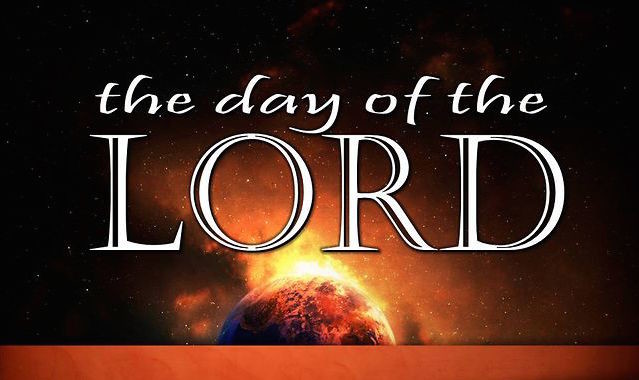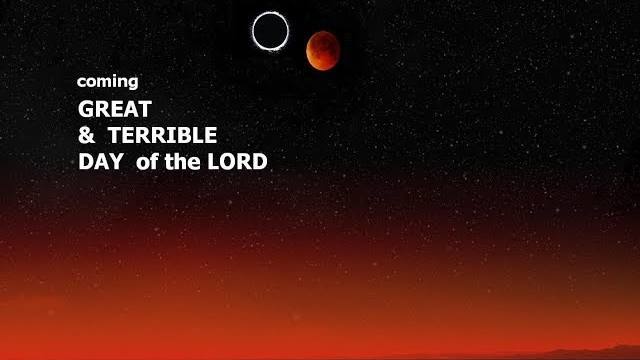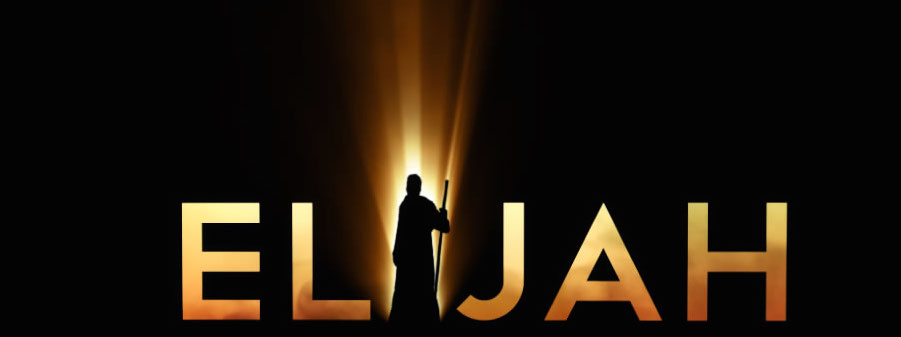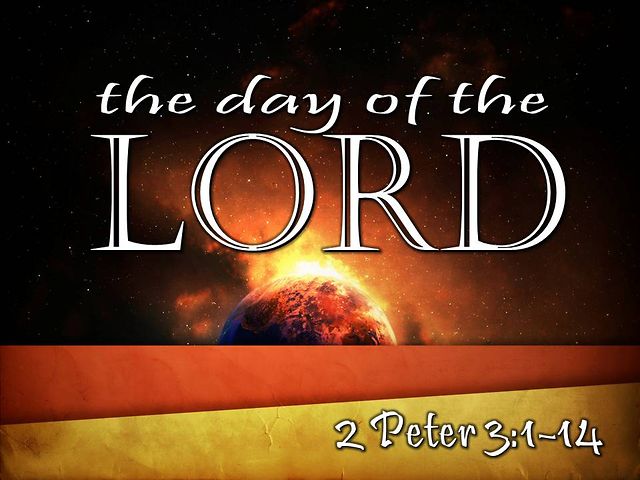Lev. 6:8 – Lev. 8:36
The Bible tells us that before the coming of “the great and terrible day of the LORD,” – ״יום יהוה הגדול והנורא״ – “Yom Adonai HaGadol veHaNura” that certain signs and wonders will appear in the sky and on the earth: “the sun will be turned into darkness, and the moon into blood” (Joel 2:30-31). Last Saturday, March 20, there was a solar eclipse. Next Saturday, April 4th, is the Jewish Sabbath day and it is also Passover. On this Passover day a blood moon will occur, which is the third in a series of four which is called a lunar tetrad. It is a very rare occurrence to have a series of four blood moons and what makes them even more significant is that each of these blood moons fall on the Jewish holidays of Passover and Sukkot (The Feast of Tabernacles). The first blood moon occurred on Passover, April 15, 2014 and the last one will be on Sukkot, September 28, 2015. Is God speaking to us from the heavens?
The prophet Joel speaks of “the day of the LORD” when there will be great deliverance for those who call on the name of the LORD (Joel 2:32) and great judgement for those who have acted wickedly and reject the ways of the LORD, especially in regard to Israel and the people of God (Joel 3:1-3). We will all meet and stand before God one day. Are we ready to meet God?
How should we as human beings prepare to meet God? This is the essence of much of the Bible. In the Jewish Bible, the Old Testament, preparing to meet God is the central focus in the book of Leviticus with the climax being found in Leviticus 16, which describes the Day of Atonement. God set crystal clear boundaries, gave specific commands, and set certain people apart to guide and lead the people to come and meet with Him.
Preparing to Meet God
In this week’s Torah Portion (Lev. 6:8 – Lev. 8:36) God commanded (צו – tsav) Moses in the details of how sacrifices were to be presented and how Aaron and his sons should fulfill their obligations. In the last chapter of this Torah Portion (chapter eight) God commanded Moses to consecrate Aaron and his sons through a process of washing them with water, anointing them with oil, and presenting three separate sacrifices to the LORD for atonement, cleansing from sin, and ordination (Lev. 8:1-30). This process was then followed by a seven-day period in which Aaron and his sons were to remain at the entrance of the tent of meeting (Lev. 8:31-36). It was through this process that God would consecrate and ordain Aaron and his sons for the priesthood and invite them into His presence.
The Nearness of God
Adam and Eve once enjoined sweet communion with God before the fall, however, as soon as they sinned there was separation in this relationship (Gen. 3:8). Ever since that day mankind has struggled to approach God, to listen to His voice, and to enjoy the nearness of God.
An Orthodox Jewish Perspective
The relational aspect of man with God and the concept of “meeting God” in orthodox Judaism is a very distant concept. God is viewed as a entity that is completely separated from humanity. Despite the fact that the Bible continually speaks of a relational side of God, Orthodox Judaism will often try to downplay this characteristic or explain it away as something nonexistent. A clear example of this is found in an orthodox Jewish commentary on the book of Leviticus:
“The Onkelos Targumist purposely inserted 167 differences from the original Hebrew biblical text in Leviticus… to enhance respect for God and to remove the mistaken implication that God is corporeal or that He acts in a human manner.” (The Irwin Jonas Onkelos on the Torah, Leviticus. p, 56)
Do you understand what this is saying? Onkelos is a respected targumist (an interpreter of the Scriptures) amongst orthodox Jews. Onkelos has changed the wording of the Biblical text in 167 different places (just in the book of Leviticus) in order to keep God from appearing to resemble a human being or act in a human manner.
Orthodox Judaism rejects the concept of God taking on human characteristics, especially having a physical body. This is one of the key problems that orthodox Judaism has with the New Testament and the teaching of Yeshua, the Son of God. How can God become a man? Ironically, the answer is found in Jewish tradition.
Shabbat HaGadol & Jewish Tradition
I am often surprised and amazed to see how often orthodox Judaism rejects the concept of God becoming man but at the same time gives credence to this same concept through Jewish tradition with Scriptural support. A great example of this is the special Sabbath that occurs this week, March 27.
This sabbath is called “Shabbat HaGadol” or “The Great Sabbath.” It could also be translated as “the Sabbath of the Great one.” It is a unique and special Sabbath which always occurs on the Sabbath before Passover. The Great Sabbath is not a biblical mandate but rather a traditional Jewish day that is observed in preparation for the Passover. Two significant events are connected to this day of “The Great Sabbath.”
The first event is connected to the original Passover. It is believed that the first Shabbat Hagadol was the 10th of Nisan while the Israelites were still in Egypt. This would have been the day that the Israelites chose the Passover lamb, according to the command of the LORD (Ex. 12:3). Judaism teaches that it had to be a Sabbath because of certain miracles which occurred, although, this is just speculation.
One of the traditions on the Great Sabbath is to read part of the Passover Haggadah (the book of order for Passover) beginning from the paragraph that starts with the words: “We were slaves” until the words “to atone for all of our sins.” One reason for this is that the redemption began on Shabbat haGadol. The redemption of the children of Israel began with the choosing of the Passover lamb and would be culminated in the sacrifice of the lamb on Passover day. The reading from the Haggadah ends with the reminder that our sins are atoned for. There is great expectation of redemption, atonement, and freedom on this Shabbat HaGadol.
The second event reveals the source of the title “Shabbat HaGadol” and is connected to the coming of the Messiah. It says in Malachi 4:5 “Behold, I am going to send you Elijah the prophet before the coming of the great and terrible day of the LORD.” This verse speaks of ״יום יהוה הגדול והנורא״ – “Yom Adonai HaGadol veHaNura” – “the great and terrible day of the LORD,” and from this phrase which speaks of the “Great Day of the LORD” is derived the name of this special Sabbath, “Shabbat HaGadol” or “The Great Sabbath.” This is the same phrase that we saw earlier in the book of Joel. On this “great day,” spoken of by the prophet Malachi, is the hope of the Messiah’s coming. Orthodox Jews believe that the prophet Elijah precedes the coming of the Messiah based on this verse and this is the hope at Passover as an extra place is always set for Elijah. Just as “Shabbat HaGadol” always precedes Passover so the coming of Elijah will precede the coming of the Messiah.
We can see clearly that in the Jewish tradition of “Shabbat HaGadol” is the expectation of the appearing of the prophet Elijah followed by the coming of the Messiah at Passover and a great redemption accompanied by atonement for sin.
In the New Testament Yeshua stated clearly that John the Baptist was the messenger who was to come to prepare the way. John came in the spirit of Elijah, to prepare the way before the LORD (Matthew 11:7-14). Yeshua quoted Malachi 3:1 when He spoke of John being Elijah. In so doing Yeshua was confirming that He Himself is the LORD.
“Behold, I am going to send My messenger, and he will clear the way before Me. And the Lord, whom you seek, will suddenly come to His temple; and the messenger of the covenant, whom you delight, behold, He is coming, says the LORD of hosts.” – Malachi 3:1
Malachi 3:4 – Malachi 4:6 is read by Jews in the synagogue on this special Sabbath before the Passover. If we start at verse one of chapter three we read that God will send His messenger and He Himself will come to His Temple. God will purify His people and refine them so that they may present offerings to the LORD in righteousness (Malachi 3:1-4).
The LORD will Prepare His People to Meet with Him
The LORD Himself will come, purify His people, and enable His people to worship Him. Just as God gave the children of Israel a way to approach Him through the Levitical Law, so God has made all of the necessary provisions for us to come to Him today. God is not a God who is distant but rather a God who is near. A day already came when God visited this earth in the flesh through His Son, Yeshua. At that time Yeshua provided redemption and atonement for sin by dying on Passover. We still wait for the day of the LORD when He will come again to reign in all of His glory.
The “day of the LORD” will come with judgement and fire. It will come to cleanse this world from all unrighteousness and establish a righteousness from God (2 Peter 3:1-13). In light of this fact, what kind of people should we be? The Word exhorts us to be spotless and blameless and to be diligent to be found by Him in peace (2 Peter 3:14). We should be inspired to live holy lives and regard the patience of the LORD as salvation for those around us (2 Peter 3:15). Let us always look forward to the day of the LORD and long for His coming. Let us be wise, understand the times, and be ready to meet with God.
Shabbat Shalom!
If you enjoyed reading this article, we invite you to sign up for our weekly Torah Portion commentary on the sidebar to the right.
Torah Portion: Lev. 6:8 – Lev. 8:36
Hafatara: Malachi 3:4 – Malachi 4:6
Return to Torah Portion Homepage
Copyright Jewels of Judaism. All rights reserved 2015






Numbers 23 19 God is not a man. Or the son of man.. Samuel 15 29 God is not a man Hosea 11 9 God is not a man.. . This is not a Jewish website!!! Why do u pretend to be Judaism and sneak an idol in the back door?!
I appreciate your comments Josh, however, we do see how God Himself appears in a glorified human form as we read in Exodus 24:9-11. Have you read this passage?
Have you read Daniel, Isaiah? Messiah came and Jew rejected Him as prophesied. Daniel gives you a pretty good timeline when Messiah would come and He did.
Those who lead many to righteousness like the star for ever and ever